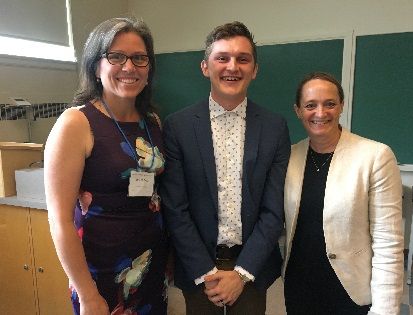
More than 150 professional legal educators from across the country met at Queen’s Law recently to engage in a broad conversation about new ways to reimagine legal education. At “The Whole Lawyer 2.0” conference, 77 presenters – including 17 Queen’s Law community members – shared their research on topics ranging from ethics to technology as they looked at how to re-orient the framework of legal thinking towards a more modern and comprehensive perspective.
“The program was tremendous, offering so much variety and exploring many broader topics and concepts that will inform our work in ways we may not even see,” says Karla McGrath, LLM’13, Executive Director of the Queen’s Law Clinics and conference co-organizer.
“It’s always great to leave a conference with new ideas and teaching tools,” she adds. “For me, the best of these were reflections on the role of law schools in the licensing process, the call for feminist curiosity and the opportunity to further engage a variety of Indigenous issues and perspectives.”
The event, held from May 31 to June 2, brought together two of Canada’s leading legal teaching associations: the Association for Canadian Clinical Legal Education (ACCLE), and the Canadian Association of Law Teachers (CALT). Renu Mandhane, Chief Commissioner of the Ontario Human Rights Commission, delivered the keynote speech.
“This conference is always as much about networking with colleagues as it is about attending the learning sessions,” says McGrath. “It was very special to be able to showcase the Queen’s Faculty of Law, the Queen’s Law Clinics and the city of Kingston for our provincial, national and international colleagues.”
Queen’s Law professors, graduate students and alumni discussed their manifold topics.
Professor Sharryn Aiken both presented and moderated on panels concerning teaching social justice and empathy in the law school classroom.
Basil Alexander, a PhD candidate, provided insights from his qualitative research regarding cause lawyers and the key skills, influences and approaches that they see as important for them to be effective.
Professor Beverley Baines, Law’73, gave a presentation that reclaimed the histories of some early women law professors in Canada.
Faisal Bhabha, Law’02, an associate professor at Osgoode Hall Law School, participated in an interactive conversation about some of the pressing and foundational questions facing legal education, by engaging in a thought experiment with other members of his panel.
Christa Bracci, LLM’18, an adjunct instructor at Queen's Law, discussed the findings of her qualitative research study involving stakeholders in Ontario legal education, described the taxonomy she uses to ground what constitutes “skills” and where instruction around skills might best be anchored in the legal education curriculum.
Lisa Cirillo, Law’96, the Executive Director of the University of Toronto’s Community Legal Clinic and the ACCLE Conference Chair, spoke on legal clinics and student representation in legal matters.
Heather Cole, Law’96, Assistant Dean of Students at Queen’s Law, and Katherine Prescott, the school’s Education Innovation Developer, jointly presented on an ambitious and pioneering project to develop artificially intelligent simulations to offer students the opportunity to test their critical thinking skills in a safe environment with no risks to real clients.
Kerri Froc, PhD’16, an Assistant Professor at the University of New Brunswick’s Faculty of Law, explored the phenomenon of Canadian legal schools employing predominantly U.S. and U.K. trained law professors.
Sari Graben, LLM’04, an Associate Professor of Law & Business at Ryerson University, spoke about the concept of technology as a legal system and how it fits into calls for legal reform.
Debra Haak, PhD candidate, drew on the concept of the practising lawyer as a problem solver, to propose an expanded role for facts in legal education.
Professor Erik Knutsen and his panel discussed how they have employed experiential learning to help students develop practice foundations for matters regarding interviews, drafting pleadings, discovery, confidentiality, and recognizing and resolving legal issues.
Michele Leering, PhD candidate, chairs the Legal Education Working Group of the Canadian Bar Association’s Access to Justice Subcommittee that produced the Experiential Learning Guide, a resource for Canadian law students that was piloted at Queen’s. The group’s workshop outlined the Guide’s main features, explained how they worked together in the spirit of collaborative action research to gather ideas, materials and feedback, as well as solicited feedback on next steps with the revised Guide being released nationwide this fall.
Brandon Karonyatatye Maracle, a Kenien’keha from Tyendinaga Mohawk Territory, helped open the conference. He will be joining Queen’s Law this fall as a JD student.
Professor Mary-Jo Maur, Law’85, LLM’93, discussed the benefits and challenges of new approaches to teaching and evaluation in large classes of 50-plus students, and considered the feasibility of developing an online “Teaching and Evaluation Exchange Portal” hosted by CALT.
In addition to being one of the conference organizers, Karla McGrath joined Rachel Law, Law’18 (Artsci’15), an articling student with the Queen’s Law Clinics, to examine how student legal clinics, particularly the Queen’s Family Law Clinic, apply the advantages of a limited scope retainer to clinic work allowing students to maximize the impact of limited resources to assist a greater number of clients.
Asked about her insights into the difference between teaching law and teaching to become a lawyer, McGrath mused, “Some perceive a tension between the doctrinal stream (teaching students the law) and the clinical stream (teaching students to practice law). I think that the key is a balance between the two with the faculty providing the foundation upon which the clinical experience rests. Bringing the two types of instructors together as we did during this conference creates an opportunity for each to learn from the other and for all of us to move toward establishing and maintaining that balance.”
By Aschille Clarke-Mendes